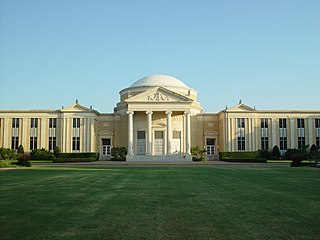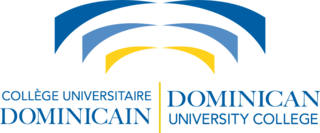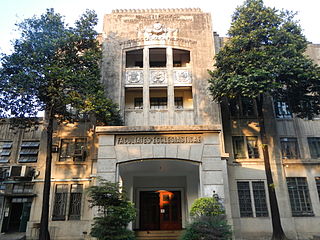
A college is an educational institution or a constituent part of one. A college may be a degree-awarding tertiary educational institution, a part of a collegiate or federal university, an institution offering vocational education, a further education institution, or a secondary school.
In a number of countries, a university college is a college institution that provides tertiary education but does not have full or independent university status. A university college is often part of a larger university. The precise usage varies from country to country.

A seminary, school of theology, theological seminary, or divinity school is an educational institution for educating students in scripture and theology, generally to prepare them for ordination to serve as clergy, in academics, or mostly in Christian ministry.

The University of Regina is a public research university located in Regina, Saskatchewan, Canada. Founded in 1911 as a private denominational high school of the Methodist Church of Canada, it began an association with the University of Saskatchewan as a junior college in 1925, and was disaffiliated by the Church and fully ceded to the university in 1934; in 1961 it attained degree-granting status as the Regina Campus of the University of Saskatchewan. It became an autonomous university in 1974. The University of Regina has an enrolment of over 15,000 full and part-time students. The university's student newspaper, The Carillon, is a member of CUP.

Knox College is a postgraduate theological college of the University of Toronto in Toronto, Ontario, Canada. It was founded in 1844 as part of a schism movement in the Church of Scotland following the Disruption of 1843. Knox is affiliated with the Presbyterian Church in Canada and confers doctoral degrees as a member school of the Toronto School of Theology.
In Western universities, a Bachelor of Divinity or Baccalaureate in Divinity is a postgraduate academic degree awarded for a course taken in the study of divinity or related disciplines, such as theology or, rarely, religious studies.
Tyndale University is a Canadian private interdenominational evangelical Christian university in Toronto, Ontario, which offers undergraduate and graduate programs. Tyndale students come from over 40 different Christian denominations.

Huron University College is a university college affiliated with the University of Western Ontario in London, Ontario, Canada. It was Incorporated on the 5 May 1863. Huron is the founding institution of the University of Western Ontario.

Wycliffe College is an evangelical graduate school of theology at the University of Toronto. Founded in 1877 as an evangelical seminary in the Anglican tradition, Wycliffe College today attracts students from many Christian denominations from around the world. As a founding member of the Toronto School of Theology, students can avail themselves of the wide range of courses from Canada's largest ecumenical consortium. Wycliffe College trains those pursuing ministry in the church and in the world, as well as those preparing for academic careers of scholarship and teaching.

St. Augustine's Seminary is the archdiocesan seminary of the Roman Catholic Archdiocese of Toronto, and is located by the shore of Lake Ontario in Scarborough. It is a member of the Toronto School of Theology.
Martin Luther University College, formerly Waterloo Lutheran Seminary, is a seminary of the Evangelical Lutheran Church in Canada federated with Wilfrid Laurier University, located in Waterloo, Ontario.

The Dominican University College is a bilingual university located in Ottawa, Ontario, Canada. Since 2012, Dominican University College has been an affiliated college of Carleton University.
Thorneloe University, also known as Thorneloe University at Laurentian, is an Anglican affiliated university formerly federated with, and still inset on the campus of, the larger Laurentian University in Sudbury, Ontario, Canada.

The Interdenominational Theological Center (ITC) is a consortium of five predominantly African-American denominational Christian seminaries in Atlanta, Georgia, operating together as a professional graduate school of theology. It is the largest free-standing African-American theological school in the United States.
The Licentiate in Theology or Licence in Theology is a non-degree qualification in theology awarded in Canada and previously awarded in the United Kingdom, Australia, and New Zealand.

King's University College is an affiliated university college of the University of Western Ontario located in London, Ontario, Canada. It is a Roman Catholic, co-educational, liberal arts college. Originally named Christ the King College, the school was founded to provide the all-male seminary with education in the liberal arts. The school was founded in 1954 and first began holding classes in 1955. King's is the largest affiliated college of the University of Western Ontario and enrolls 3,500 students.

Ambrose University is a private Christian liberal arts university located in Calgary, Alberta, Canada.

University of Saskatchewan has over 200 academic programs on its Saskatoon, Saskatchewan campus, and is internationally known for its teaching and research. The on-campus synchrotron Canadian Light Source makes it the only Canadian institution for such nuclear and biotechnology research. Canadian Light Source nuclear research facility provides research and analysis of the internal structures of advanced materials and biological samples. The College of Arts and Science is the largest of the U of S and comprises five separate health science fields in addition to numerous other programs in the Arts, Social Sciences, Humanities, and Natural Sciences. The Department of Computer Science as well as the College of Engineering are ranked highly within their fields. The founding college, the College of Agriculture, is still providing agricultural breakthroughs which are utilized worldwide.

The University of Santo Tomas Faculties of Ecclesiastical Studies are the ecclesiastical schools of the University of Santo Tomas, the oldest and the largest Catholic university in Manila, Philippines.
Canterbury College is a small liberal arts college affiliated with the University of Windsor founded by the Anglican Church of Canada.